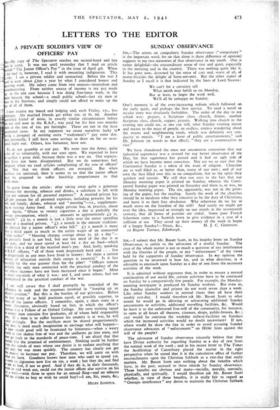LETTERS TO THE EDITOR
A PRIVATE SOLDIER'S VIEW OF OFFICERS' PAY —My copy of The Spectator reaches me second-hand and late in camp. It was not until yesterday that I read an article tided "The Junior Officer's Pay " in the issue of April 4th. When did read it, however, I read it with mounting indignation. This why. I am a private soldier and unmarried. Before the war I to earn about £300 a year by what I considered honest and ing work. My salary came from two sources—journalism and ]mastering. From neither source of income is my pay made in the one case because I was doing free-lance work, in the er because the school—a small public school—lost six men at to the Services, and simply could not afford to make up the y of all of them.
I now receive my board and lodging and, each Friday, t5s., less pages. My married friends get either tos. or 8s. 6d. Another cried friend of mine, in exactly similar circumstances before war and now in the R.A.F., was paid for his first two months at the rate of LOS. per fortnight. These are not in the least ptional cases. In my regiment we count ourselves lucky ins ing a prospect of earning extra " tradesman's " pay some day. , personally, I still have some savings to draw on for an occa- 1 night out. Others, less fortunate, have not.
We do not grumble at our pay. We went into the Army, quite few of us voluntarily, with our eyes open. We expected to have sacrifice a great deal, because there was a war on. Our expecta- s have not been disappointed. But we do sometimes feel, gnant when we read articles complaining of the rate of officers'
Not that we think officers are overpaid. But when 'Bees are universal, then it seems to us that the junior officer sat be prepared to suffer hardship proportionate to that ' his men.
To quote from the article: after taking away quite a generous wance for messing, tobacco and drinks, a subaltern is left with i.55 per annum for all personal expenses." A married private has per annum for all personal expenses, including presents for his e and family, drinks, tobacco and " messing "—i.e., supplement- or varying Army food. A single private has, in practice, about Again, " fifteen to twenty cigarettes a day is probably the tinge consumption, which . . . amounts to approximately £2 5s. month." £2 5s. a month is just a little over the entire spending ey of a married private. " £5 a month is the amount tradition- }• allowed for a junior officer's wine bill." £5 a month is more a third again as much as the entire wages of an unmarried her ranks." " Messing charges average about 3s. 3d. a day "- private's food is not bad, but our last meal of the day is at 30 p.m., and we must spend at least 6d. a day on food—which more than a third of the married man's pay. And, lastly, speaking R.A.F. officers, " all of them work desperately hard and . . . live dangerously as any men have lived in history : for them a certain cunt of relaxation outside their camps is essential." Is it less scltial for the rear gunner than for the pilot? " Officers remain obably the only men connected with the practical conduct of the : whose incomes have not been increased since it began." Mine about one-sixth of what it was: and I, and some others, feel not concerned in the practical conduct of the war.
am well aware that I shall promptly be reminded of the :Iference in rank and the expenses involved in " keeping up an -11's position." But this is the burden of our grievance. Before war many of us held positions equal, or possibly superior, to .e of the junior officers. I remember, again, a short story in a Spectator, obviously based on fact, in which the officer's than was a Fellow of an Oxford College. My own training squad twenty men contains five 'graduates, all of whom held responsible • If a man is to suffer because his country is at war, he will r willingly. But the sacrifices must be shared proportionately. r does it need much imagination to envisage what will happen— how much good will be frustrated by bitterness—when a weary add at last shakes free of war and the uniforms go into store, and go back to the standards of peace-time. I am afraid that that like the jeremiad of embitterment. Nothing could be further the minds of men whose one desire is to endure anything that end the war more quickly. The country has clearly not got money to increase our pay. Therefore, we will carry on with We have. Goodness knows how men who used to spend toe. wetk oa cigarettes now live on toe. a week ; but they do, and find Imt so bad, if not so good. And if they do it, in their thousands, eel in and week out, could not the junior officer also survive on his a week—with three to spare for an annual fiing—and no tobacco II° drinks to buy or wish he could buy?—I am, Sir, yours, &c.,
MILES IGNOTUS.






























 Previous page
Previous page